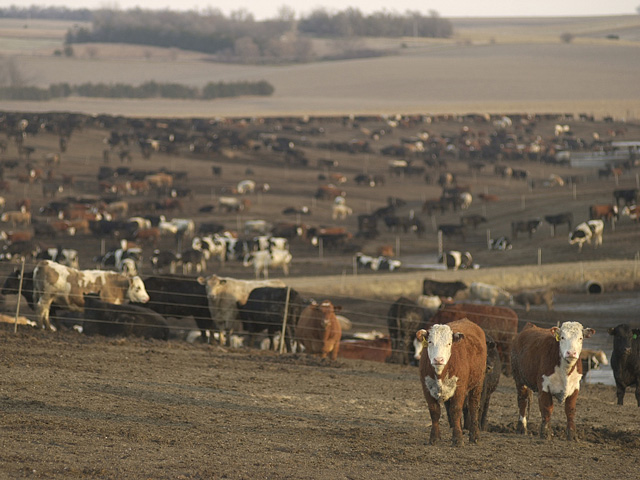Methane Reduction Trials
Feed Ingredient Reduces Methane in Ruminants
A two-year trial out of Canada shows a novel feed ingredient can be included in commercial feedlot diets to reduce methane emissions by up to 80% without negative effects on animal health and performance parameters and carcass characteristics.
Royal DSM developed a feed ingredient to reduce enteric methane formation in ruminants by over 30% on average. The ingredient is called 3-NOP and considered a breakthrough technology that inhibits methane formation in the rumen of cattle.
P[L1] D[0x0] M[300x250] OOP[F] ADUNIT[] T[]
The trial looked at commercial viability of feeding 3-NOP in backgrounding in finishing operation in Alberta's beef cattle industry in a large-scale field trial. The project evaluated: (1) relative effects of feeding the product on methane reduction and feedlot performance, health and carcass quality outcomes in feedlot cattle fed typical North American finishing diets (corn and barley grain diets) as well as in a high forage backgrounding diet; (2) direct measurement techniques for methane emissions in a commercial beef feedlot where the product was used; and (3) the use of the product in day-to-day practicalities of commercial feedlots.
An average 70% enteric methane emission reduction was shown when the feed ingredient was provided in steam-flaked or dry-rolled barley finishing diets at 125 mg/kg of feed dry matter. The reduction was 31% to 80% in steam-flaked corn based finishing diets at the 125 mg/kg rate. In backgrounding diets, increasing the dose from 150 to 200 mg/kg decreased yield of methane by 17% to 26%.
Steve MacDonald, CEO Emissions Reduction Alberta, noted: "Alberta's agricultural sector is a world leader in sustainability practices. The results of this trial highlight that further opportunities are on the horizon for beef and dairy producers to better manage methane from cattle."
DSM has filed for commercial registration of the novel feed ingredient under the name Bovaer.
The trial was conducted by a Canadian Research Consortium, made up of Agriculture and Agri-Food Canada, Feedlot Health Management Services, Viresco Solutions and DSM Nutritional Products, with support from the Alberta Cattle Feeders Association.
(c) Copyright 2021 DTN, LLC. All rights reserved.





